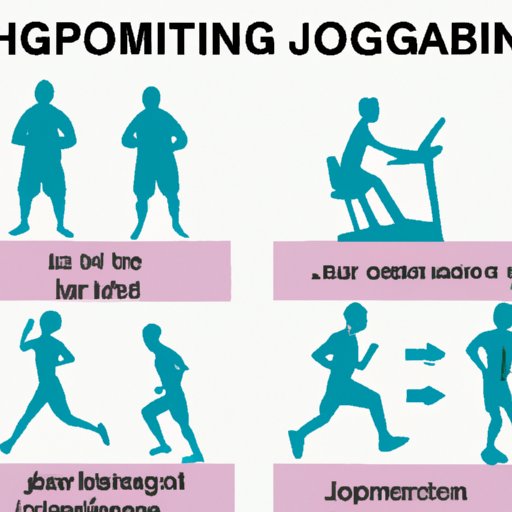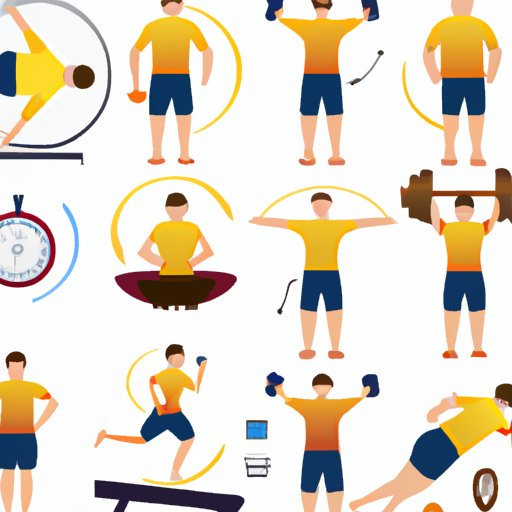Introduction
Exercising is one of the best ways to stay healthy, keep fit, and, for many people, lose weight. For some, however, regular physical activity can result in unintended weight gain. If you are wondering why you are gaining weight while exercising, it may be due to a number of factors. In this article, we explore the common causes of weight gain while exercising and provide tips to help you achieve your weight loss goals.

Uncovering the Reasons Behind Weight Gain While Exercising
Weight gain is often caused by an increase in calorie intake or a decrease in physical activity. It can also be due to underlying medical conditions such as hypothyroidism, Cushing’s disease, or polycystic ovarian syndrome. When it comes to weight gain while exercising, there are several potential factors at play.
Common Causes of Weight Gain
One of the main reasons why people gain weight while exercising is that they are not aware of the amount of calories they are consuming. Consuming more calories than you burn during physical activity can lead to weight gain, even if you are exercising regularly. Additionally, many people overestimate the number of calories they are burning through exercise and underestimate the amount of food they are eating, which can also contribute to weight gain.
Effects of Exercise on Weight Gain
In addition to diet, exercise can also have an effect on weight gain. Certain types of exercise, such as strength training and high-intensity interval training (HIIT), can cause the body to retain water and build muscle, which can lead to a temporary increase in weight. This type of weight gain is not necessarily unhealthy and can even be beneficial for those looking to build muscle mass. However, for those trying to lose weight, this can be discouraging and lead to further weight gain.
The Benefits of Exercise vs. Unintended Weight Gain
Despite the potential for weight gain, exercise offers numerous health benefits. Regular physical activity has been linked to improved mental and physical health, increased energy levels, and better sleep. Additionally, regular exercise can help reduce the risk of chronic diseases such as heart disease, stroke, and diabetes. Therefore, it is important to maintain an active lifestyle despite any potential weight gain.
How Exercise Can Help with Weight Loss
When done correctly, exercise can be an effective tool for weight loss. Incorporating aerobic activities such as walking, jogging, or swimming into your exercise routine can help you burn calories and lose weight. Additionally, strength training can help build muscle, which can help increase your metabolism and burn more calories throughout the day. Finally, HIIT can be an effective way to burn fat and calories quickly.
Potential Risks of Not Exercising
Not exercising regularly can have serious consequences for your health, including an increased risk of developing chronic diseases. Additionally, not getting enough physical activity can lead to weight gain and a decreased quality of life. Therefore, it is important to make sure you are getting enough exercise to maintain your overall health and well-being.
Identifying and Overcoming Common Causes of Weight Gain During Exercise
If you are struggling to lose weight despite regular exercise, it may be due to one of the following factors:
Improper Diet or Eating Habits
Your diet plays a major role in your ability to lose weight. Eating too many calories or the wrong types of foods can lead to weight gain. To ensure your diet is helping you reach your weight loss goals, focus on eating nutrient-dense foods such as fruits, vegetables, lean proteins, and whole grains. Additionally, try to limit processed foods and sugary drinks, which can lead to weight gain.
Lack of Proper Rest
Getting enough sleep is essential for maintaining good health and losing weight. Sleep deprivation can lead to overeating, cravings for unhealthy foods, and a decrease in physical activity, all of which can contribute to weight gain. Aim for 7-9 hours of sleep per night to ensure you are getting enough rest.
Not Enough Physical Activity
If you are not getting enough physical activity, you may be struggling to lose weight. To ensure you are getting enough exercise, aim for at least 30 minutes of moderate physical activity 5 days a week. Additionally, consider incorporating strength training into your routine 2-3 times a week to help build muscle and burn fat.

How to Exercise for Weight Loss Success
To maximize your weight loss efforts, it is important to develop a balanced exercise routine. Here are some tips to help you get started:
Develop a Balanced Exercise Routine
Creating a balanced exercise routine is key to achieving your weight loss goals. Include aerobic exercises such as walking, running, or swimming, as well as strength training to build muscle. Additionally, consider adding HIIT to your routine for an extra boost. Try to include a variety of exercises to keep your workouts interesting and challenging.
Monitor Your Progress
It is important to monitor your progress to ensure you are seeing results. Consider tracking your weight, measurements, and fitness goals to gauge your progress. Additionally, take photos of yourself every few weeks so you can see the changes in your body over time.
Adjust Your Exercise Routine as Needed
If you find that you are not seeing results, it may be necessary to adjust your exercise routine. Consider changing up your routine or increasing the intensity of your workouts. Additionally, make sure you are getting enough rest and eating a balanced diet.
What You Should Know About Weight Gain and Exercise
Weight gain does not necessarily mean muscle growth. Many people experience temporary weight gain due to an increase in water retention or muscle mass from exercise. This type of weight gain is not unhealthy and can even be beneficial for those looking to build muscle. However, if you are looking to lose weight, it is important to monitor your progress and adjust your exercise routine as needed.
Consider Other Factors When Trying to Lose Weight
In addition to exercise, there are other factors that can affect weight loss. These include stress, hormones, and genetics. To ensure you are losing weight in a healthy and sustainable way, it is important to consider these factors when creating your weight loss plan.

Eating Habits and Exercise: Why You May Be Gaining Weight Despite Working Out
Your diet plays a major role in your ability to lose weight. Without proper nutrition, it can be difficult to shed pounds despite regular exercise. Here are some tips for maintaining a healthy diet and avoiding weight gain:
Understanding Calories
Calories are the units of energy found in food. To lose weight, the goal is to consume fewer calories than you burn. Pay attention to the number of calories in the foods you eat and adjust your diet accordingly.
Eating the Right Foods
Eating the right foods is essential for successful weight loss. Focus on eating nutrient-dense foods such as fruits, vegetables, lean proteins, and whole grains. Avoid processed foods and sugary drinks, which can lead to weight gain.
Maintaining a Healthy Diet
To maintain a healthy diet, it is important to practice mindful eating. Pay attention to your body’s signals and stop eating when you are full. Additionally, avoid skipping meals, which can lead to overeating later in the day.
Conclusion
Gaining weight while exercising can be discouraging but is often due to a number of factors. Improper diet or eating habits, lack of rest, and not enough physical activity can all contribute to weight gain. To maximize your weight loss efforts, it is important to develop a balanced exercise routine and maintain a healthy diet. With the right approach, you can achieve your weight loss goals.
(Note: Is this article not meeting your expectations? Do you have knowledge or insights to share? Unlock new opportunities and expand your reach by joining our authors team. Click Registration to join us and share your expertise with our readers.)
